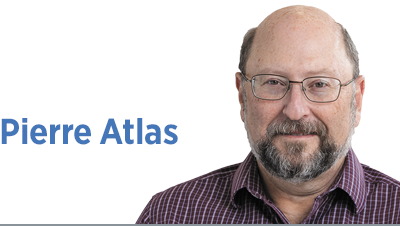Subscriber Benefit
As a subscriber you can listen to articles at work, in the car, or while you work out. Subscribe Now I have been teaching in the college classroom for over 30 years.
I have been teaching in the college classroom for over 30 years.
My first teaching experience, as a political science master’s student at the University of Arizona, coincided with the Gulf War. Students were marching against the war but also in support of it, as the U of A had a large contingent of Kuwaiti students who wanted their country liberated.
My personal experience with campus protests goes back further. My mother was a professor at UCLA during the Vietnam War. I witnessed antiwar protests and have vivid memories of seeing a police officer beating a student off campus in Westwood Village.
Today, many campuses around the country, including Indiana University and my Ph.D. alma mater, Rutgers University, have been roiled by protests over the war in Gaza.
The college campus is the ideal venue for discussion of controversial issues. There should be teach-ins and other activities where both students and faculty can express and exchange their passionate views on Gaza in a civil manner, respecting the inherent dignity of one another. Faculty with different perspectives should help facilitate the discussion as educators. Administrators and protesters should engage in dialogue.
Instead, many campuses have devolved into tribalism with ideological litmus tests, intolerance of other views, angry confrontations, antisemitic targeting of Jewish students and acts of lawlessness.
A critical element of nonviolent civil disobedience, which has a long and storied history in America, is the willingness to get arrested to bring attention to the cause or injustice. That means not resisting arrest and not hiding your face. But in many instances, militant groups are taking over the protest agenda.
Free speech is essential to campus life. But harassment and intimidation of fellow students is not free speech and cannot be tolerated. The same goes for violence, vandalism and illegal trespassing. Protesters do not have the right to disrupt teaching and learning or commencement ceremonies. All colleges have student codes of conduct that prohibit such behavior, and these should be enforced transparently and consistently across all cases with suspensions, expulsions and other sanctions.
Deploying riot police or militarized tactical units can be counterproductive and escalatory, rather than de-escalatory. However, protestors on some campuses are vowing to remain in their (often illegal) encampments until there is divestment and boycott of Israel, and some are ratcheting up their illegal activities. With universities refusing to capitulate to unrealistic and radical demands, aggressive confrontations between pro-Palestinian students and law enforcement become more likely.
One of my graduate professors used to say, “A political scientist’s favorite color is gray,” and that scholars should resist categorizing reality into unnuanced, black-and-white dichotomies. I find it disheartening that simplistic, “good versus evil” worldviews have taken over our universities.
Too many people on the pro-Palestinian side refuse to address Hamas’ terrorist attack of Oct. 7, which instigated the Gaza war, and do not include releasing the hostages in their calls for a ceasefire. The extremist National Students for Justice in Palestine goes much further: It rejects Israel’s right to exist, advocates for the Jewish state’s destruction and actually praised Oct. 7. On the other hand, too many on the pro-Israel side downplay or ignore the civilian deaths, devastation and humanitarian crisis in Gaza caused by Israel’s conduct in its war against Hamas.
It is unrealistic to expect university communities to reach a consensus on this conflict. Nevertheless, for the sake of education and public safety—perhaps starting next semester—we should work to move beyond adversarial tribalism and intolerance on the college campus. That really should not be a heavy lift for a university.•
__________
Atlas, a political scientist, is a senior lecturer at the Paul H. O’Neill School of Public and Environmental Affairs at IUPUI. His opinions do not necessarily reflect those of Indiana University. Send comments to [email protected].
Click here for more Forefront columns.
Please enable JavaScript to view this content.
